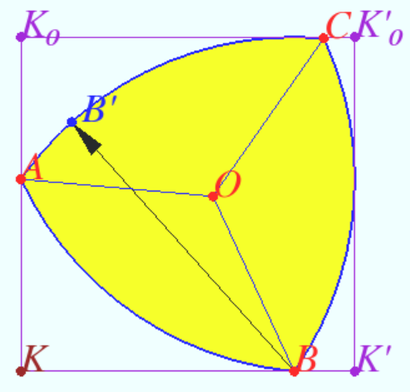Difference between revisions of "Surface of constant width"
(Created page with "A curve of constant width is a simple closed curve in the plane whose width (the distance between parallel supporting lines) is the same in all directions. A surface of const...") |
(→Reuleaux triangle) |
||
| Line 2: | Line 2: | ||
A surface of constant width (orbiform) is a convex form whose width, measured by the distance between two opposite parallel planes touching its boundary, is the same regardless of the direction of those two parallel planes. | A surface of constant width (orbiform) is a convex form whose width, measured by the distance between two opposite parallel planes touching its boundary, is the same regardless of the direction of those two parallel planes. | ||
==Reuleaux triangle== | ==Reuleaux triangle== | ||
| − | [[File: | + | [[File:Reuleaux triangle.png|410px|right]] |
| − | The boundary of a Reuleaux triangle is a constant width curve based on an equilateral triangle. | + | The boundary of a Reuleaux triangle is a constant width curve based on an equilateral triangle. |
| + | |||
Let <math>\triangle ABC</math> be equilateral triangle. | Let <math>\triangle ABC</math> be equilateral triangle. | ||
Revision as of 07:20, 10 August 2024
A curve of constant width is a simple closed curve in the plane whose width (the distance between parallel supporting lines) is the same in all directions. A surface of constant width (orbiform) is a convex form whose width, measured by the distance between two opposite parallel planes touching its boundary, is the same regardless of the direction of those two parallel planes.
Reuleaux triangle
The boundary of a Reuleaux triangle is a constant width curve based on an equilateral triangle.
Let ![]() be equilateral triangle.
be equilateral triangle.
Let ![]() be the arc centered at
be the arc centered at ![]() with radius
with radius ![]()
Arcs ![]() and
and ![]() define similarly.
define similarly.
All points on this arcs are equidistant from the opposite vertex. Distance is ![]()










